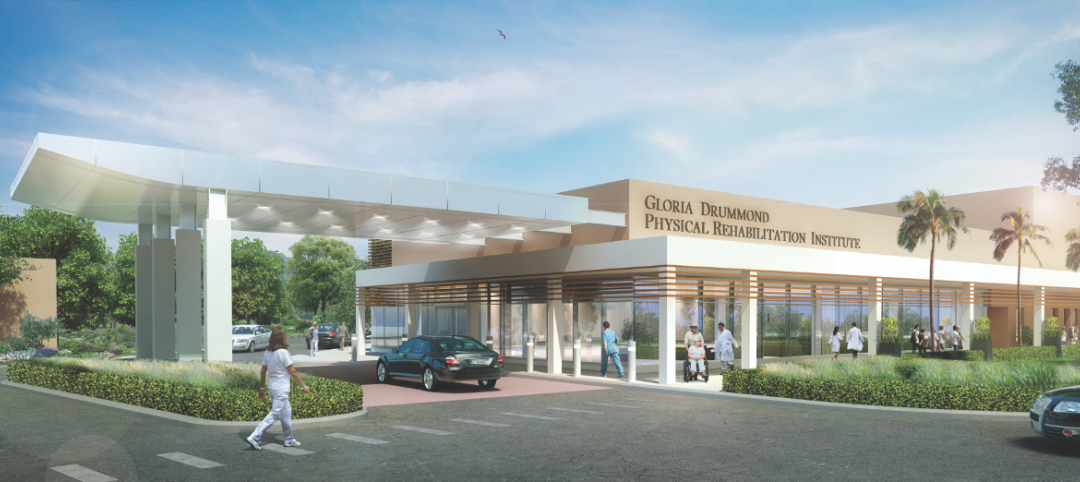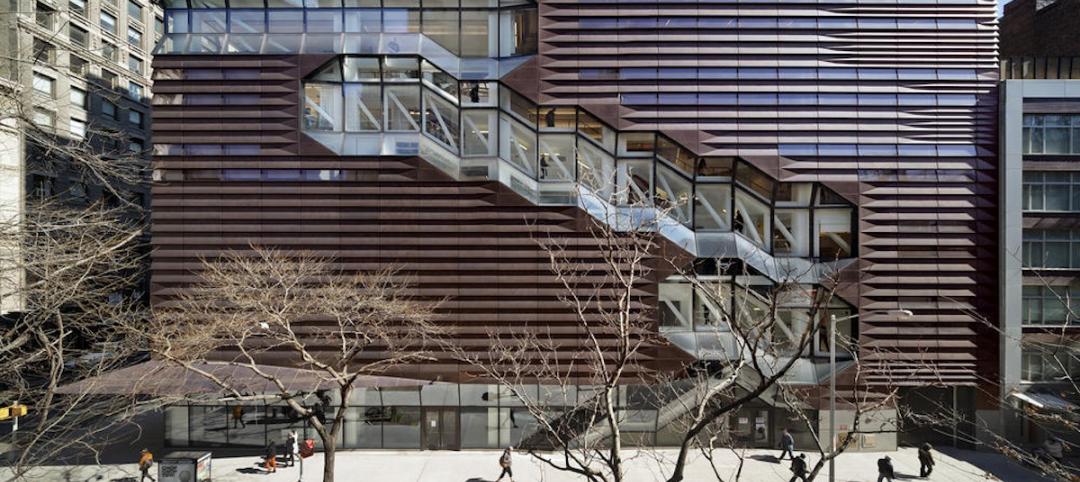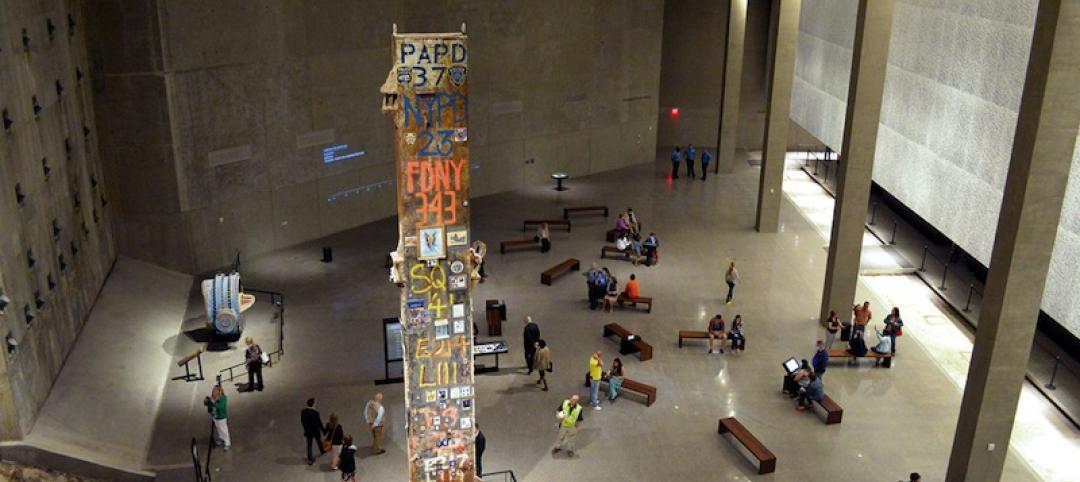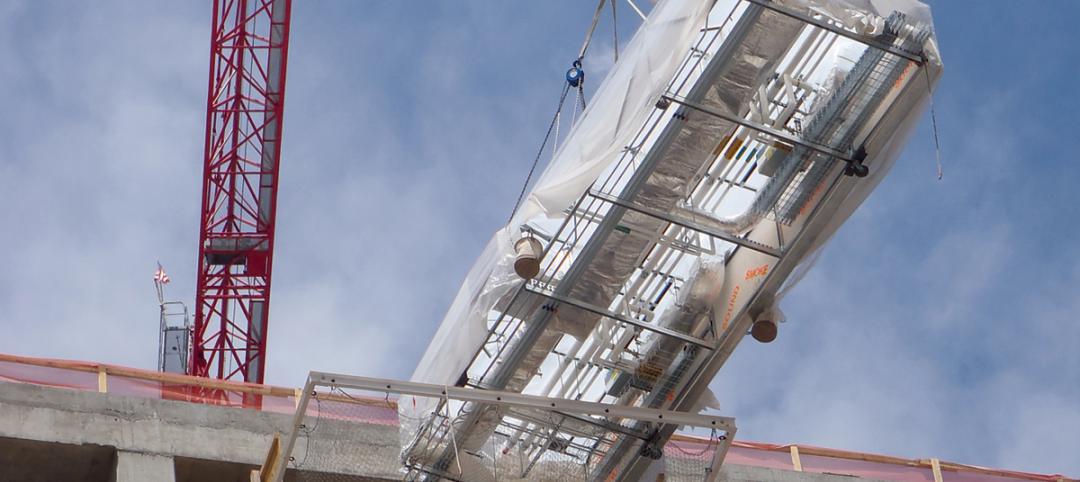 |
|
Built as an homage to the Washington Monument, Minneapolis’s funky Foshay Tower becomes the even funkier W Hotel. |
At one time the tallest building west of the Mississippi, the Foshay Tower has stood proudly on the Minneapolis skyline since 1929. Built by Wilbur Foshay as a tribute to the Washington Monument, the 30-story obelisk served as an office building—and cultural icon—for more than 70 years before the Ryan Companies and co-developer RWB Holdings partnered with Starwood Hotels & Resorts to convert the registered landmark into, of all things, a hip W Hotel.
Adaptive reuse projects are always tricky, but the building's distinctive obelisk shape complicated matters to the extent that when architects Elness Swenson Graham completed the design, there were 57 unique room configurations within the 230-room hotel. The tower loses half its floor area between the second floor and the 30th floor, dropping from 6,000 sf on the second floor to less than 3,000 sf at the top. The complex floor plates also threw MEP contractors Horwitz Inc. and Egan Companies a curve because there was no way to stack plumbing and mechanical systems. Their solution was to break the hotel into flooring groups and then make transitions between each floor set.
The Building Team also faced the high-stakes task of preserving and restoring the building's historic Art Deco lobby ceiling, marble walls, and terrazzo floors. These elements were integrated into the W's modern design aesthetic by interior design team Munge Leung Design Associates.
 |
|
The building’s tapered shape required interior designers to commission adjustable furniture that fits the hotel’s 57 different room configurations. |
On top of everything else, there was no wiggle room on the opening date, August 2008, because the Republican National Convention was being hosted in the twin city of St. Paul the following month and Starwood needed the guest rooms.
Using design-build delivery, Ryan Companies redeveloped the 268,000-sf Foshay Tower at a construction cost of $56 million. The project's final cost was $61 million after the Building Team assumed responsibility for the hotel's restaurant and retail components from the tenants.
Working in the Building Team's favor was the fact that the landmark building was structurally sound and in good shape for its age—that is, unless you ignore the fact that it was packed with asbestos. A tight timeline required asbestos remediation to begin while some office tenants were still in the building. This dictated a more complicated than usual containment system: partition systems, dedicated elevators, night work, and coordinated adjacencies. Tenants were provided generous move-out packages to expedite their exit.
Complications also arose around the building's old windows. Almost 750 units needed to be replaced, which disappointed the National Park Service, since the Foshay Tower is on the National Register of Historic Places. After considerable negotiations, the two sides agreed that replacement could proceed using custom, historically accurate, high-efficiency aluminum units.
The project greatly impressed BD+C's Reconstruction Awards judges, who appreciated the difficulties associated with adaptive reuse projects. “It is really challenging to convert an office building into a hotel,” says Lucien Lagrange, principal of Lucien Lagrange Architects, Chicago. “The Foshay project says something about adaptive reuse and the importance of saving a beautiful existing building.”

Related Stories
Giants 400 | Aug 6, 2015
GIANTS 300 REPORT: Top 80 Healthcare Engineering Firms
AECOM, Jacobs, and Burns & McDonnell top Building Design+Construction's 2015 ranking of the largest healthcare engineering and engineering/architecture firms in the U.S.
Giants 400 | Aug 6, 2015
GIANTS 300 REPORT: Top 115 Healthcare Architecture Firms
HDR, Stantec, and Perkins+Will top Building Design+Construction's 2015 ranking of the largest healthcare architecture and architecture/engineering firms in the U.S.
Giants 400 | Aug 6, 2015
HEALTHCARE AEC GIANTS: Hospital and medical office construction facing a slow but steady recovery
Construction of hospitals and medical offices is expected to shake off its lethargy in 2015 and recover modestly over the next several years, according to BD+C's 2015 Giants 300 report.
Healthcare Facilities | Jul 22, 2015
Best of healthcare design: 8 projects win AIA National Healthcare Design Awards
Montalba Architects' prototype mobile dental unit and Westlake Reed Leskosky's modern addition to the Cleveland Clinic Brunswick Family Health Center highlight the winning projects.
Healthcare Facilities | Apr 28, 2015
10 things about Ebola from Eagleson Institute's infectious disease colloquium
Research institutions know how to handle life-threatening, highly contagious diseases like Ebola in the lab, but how do we handle them in healthcare settings?
Green | Apr 22, 2015
AIA Committee on the Environment recognizes Top 10 Green Projects
Seattle's Bullitt Center and the University Center at The New School are among AIA's top 10 green buildings for 2015.
Building Team Awards | Apr 10, 2015
14 projects that push AEC teaming to the limits
From Lean construction to tri-party IPD to advanced BIM/VDC coordination, these 14 Building Teams demonstrate the power of collaboration in delivering award-winning buildings. These are the 2015 Building Team Award winners.
Building Team Awards | Apr 10, 2015
Prefab saves the day for Denver hospital
Mortenson Construction and its partners completed the 831,000-sf, $623 million Saint Joseph Hospital well before the January 1, 2015, deadline, thanks largely to their extensive use of offsite prefabrication.
Building Team Awards | Apr 10, 2015
Virtual collaboration helps complete a hospital in 24 months
PinnacleHealth needed a new hospital STAT! This team delivered it in two years, start to finish.
Building Team Awards | Apr 9, 2015
Big D’s billion-dollar baby: New Parkland Hospital Tops the Chart | BD+C
Dallas’s new $1.27 billion public hospital preserves an important civic anchor, Texas-style.
















